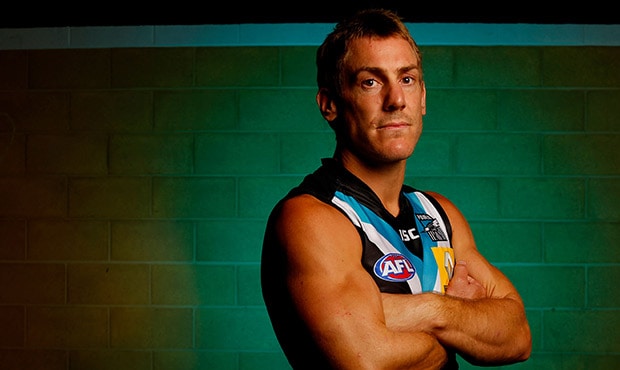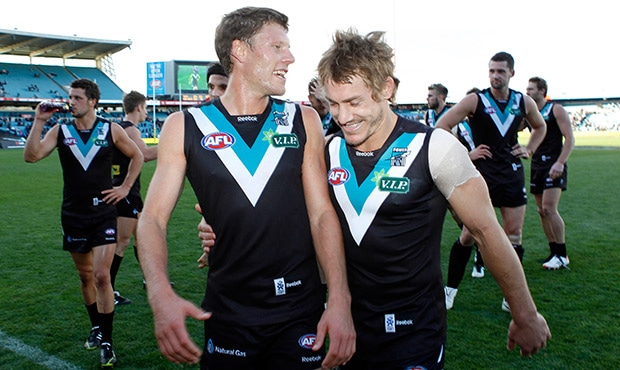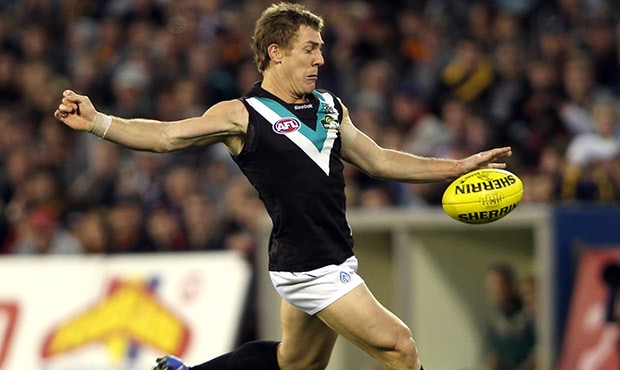IT’S been two years since Brett Ebert retired from professional football and he’s still kicking goals, off the field.
A Margarey Medal on the mantelpiece, 166 games under his belt and 11 years of memories at the club he calls home all lay in the past - and that’s just the way he likes it.
In our second edition of Life After Footy, portadelaidefc.com.au sat down to have a chat with the man himself about how his life has unfolded post-AFL…
Steph Say: How do you look back on your time at the club? With pride, nostalgia, sadness…?
Brett Ebert: With a lot of pride. We had some good years and then some tough years as well. There is some sadness there, too. I loved my time, loved the guys, coaches and upstairs staff as well – everyone. That’s probably what you miss the most, being around them and being in the team environment.
The work I’m doing now is similar, but you don’t have that closeness all the time, where you work together, play together and then go for a beer, and the banter that goes on with being in the club… there’s no other environment like it.
SS: Do you feel like you’ve exited the footy ‘bubble’, or does it always live on in you in some way?
Ebert: I loved footy, but I still always thought there was something else out there for me. I never got too stuck in the bubble – I always liked my outside life, my school mates and getting away from footy as well.
Ebert played for the Port Adelaide from 2002-2013.
SS: How difficult was it for you to finally hang up the boots back in 2013, after being plagued by injury? It can’t have been a decision you took lightly.
Ebert: It was pretty easy, actually! Obviously I really enjoyed it when I was playing, but I played 11 years in the end, and that was pretty much enough for me. My body was telling me that was enough, I was turning 30, and it was probably time for a change.
SS: Did you feel satisfied with what you’d achieved as a footballer at the time?
Ebert: It would have been nice to play a few more games, and had a bit more success at the end, but I suppose anyone who plays for a fair few years just wants to play a few more!
SS: What did it mean to share the Port Adelaide experience with not only your father, who has built his own legacy here at Alberton, but also your cousin Brad?
Ebert: It was great. I think I was the first father-son drafted to Port, so that was obviously a great thing, being able to stay home and not have to move states and be with family and friends.And then to play with Brad for two years, was outstanding. I never got the chance to play with my brother, so my cousin was close enough!
Brett with cousin Brad Ebert in Round 8, 2012.
SS: Plenty of athletes struggle with feeling displaced or lost after giving the game away. Did you ever encounter that?
Ebert: Yeah - I had a bit of time off. I did some study, I finished a sports science degree, and then I had six months there where I wasn’t sure. I was just working out what I wanted to do and where I wanted to go.
Obviously when you’re playing footy you’ve got so many people watching you and talking to you, and when you finish you feel like nobody likes you anymore. I think a lot of players struggle with that when they finish.
SS: So, how did you prepare yourself for life after footy then?
Ebert: Footy is good but the average person only plays three or four years, so for every guy that plays 15 years, there’s a guy that only plays one year. So it’s massively important to make sure you do some kind of study. I got a degree during my football career – I studied over 12 years.
SS: You’re a shining example that life after footy does exist - tell me a bit about what you’re doing with yourself now.
Ebert: I’ve got a fitness business called Ebert Health and Fitness. I do group, corporate and personal training. Business is good – I just had my first year party on the weekend, and it’s been super busy. I’ve got all different fitness levels and different types of classes that will cater for all the different things that people are looking to improve.
Fitness training is something I’ve always been interested in, and being able to train people and get in that group environment again has been great.
With the Showdown on tomorrow we showed Heath who's boss and who's going to win!!!
Posted by Ebert Health & Fitness on Friday, May 1, 2015
SS: How do you think being a footballer shaped your new venture?
Ebert: With footy you learn a lot, but you don’t think you do. When you go into the outside world, in any business, it’s always based on teamwork. A lot of people haven’t got that sense of team spirit, so to be able to have that footy backing behind you is priceless in the end.
Injury prevention too – I feel like a bit of a physio sometimes too – because I’ve had so much exposure to injury myself, it’s a huge bonus for me.
SS: What do you love most about what you do now?
Ebert: Just being able to train the average person, rather than the athlete, who actually gets paid to do it. They are coming out to train with you because they want to reach a goal – they want to better themselves. They’re often a bit nervous and shy, and then you see them develop…I find that really rewarding.
SS: A lot of players enter the coaching arena, or go into media of some kind. Were you ever tempted to do something similar?
Ebert: No, never. I coached juniors for a little bit, but I didn’t love watching video and analysing things! I just enjoyed playing.
SS: Do you get to many games these days?
Ebert: I went to a couple this year.It’s good to watch guys that you used to play with, but the list is so young now and it changes every year, so most of the guys I played with are pretty much finished now.
SS: What about yourself - do you ever get to have a kick around now?
Ebert: I’ve hardly kicked a footy since I finished! With training clients you can’t be injured, so I haven’t. I got tempted - but no.

Round 19, 2011.
SS: Do you still get recognised when you’re out and about?
Ebert: Some people think I’m Brad! Every now and then it’s good to see the supporters and people that enjoyed your footy, and Adelaide’s a small place and you get to see the supporters which is great. Some of them come out to my trainings, too!
SS: Finally – what would your advice be to players making the transition into the ‘real world’?
Ebert: You can take your time a little bit. Work out what you want to do, whether it’s going back to study, or something else, and make sure you do that.
I also think still playing footy is good, if you can! There’s plenty of country teams and SANFL teams, where you’ve still got that team environment. I think if you went from footy to nothing at a young age, it’d be really difficult.
I do think the programs for transitioning young players now are great. There’s a lot of support for them.


